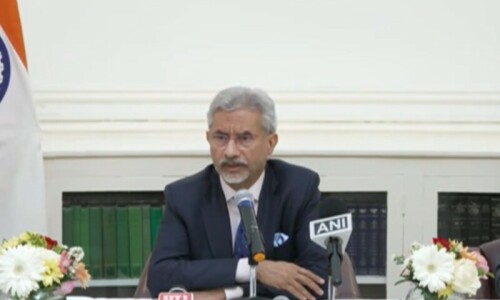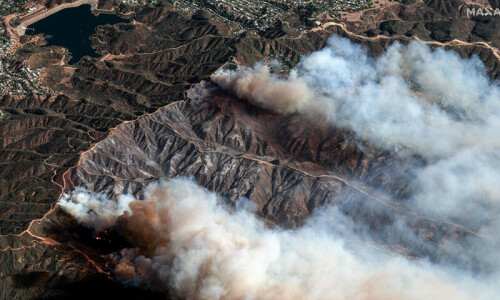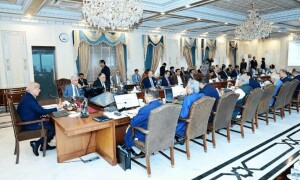The military top brass highlighted on Monday the availability of sanctuaries to the banned Tehreek-i-Taliban Pakistan (TTP) in “a neighbouring country” as one of the major reasons impacting the security of Pakistan.
The assessment was made at the 258th Corps Commanders’ Conference, held at the General Headquarters in Rawalpindi, where the participants were briefed in detail about the prevailing internal security environment, according to a statement issued by the military’s media affairs wing.
The meeting, presided over by Chief of Army Staff General Asim Munir, noted that “the sanctuaries and liberty of action available to the terrorists of the proscribed TTP and other groups of that ilk in a neighbouring country and the availability of latest weapons to the terrorists” as major reasons impacting the security of Pakistan, the Inter-Services Public Relations (ISPR) statement said.
This is the second time in less than a week that the military has made such an assertion.
Just three days ago, the ISPR said following an attack at a garrison in Balochistan’s Zhob that the armed forces of Pakistan had “serious concerns on the safe havens and liberty of action available to” the TTP in Afghanistan.
“It is expected that the interim Afghan government would not allow the use of its soil to perpetrate terror against any country, in the real sense and in line with commitments made in the Doha agreement”, the previous ISPR statement had added.
“Such attacks are intolerable and would elicit an effective response from the security forces of Pakistan,” it read.
The Doha agreement was signed in the Doha capital, Qatar, between the US and Afghan Taliban in February 2020 to bring an end to the 2001–2021 war in Afghanistan. The agreement ultimately led to the withdrawal of US forces from Afghanistan on Aug 15, 2021.
The pact also included guarantees from the Afghan Taliban that they would prevent militant groups including al Qaeda from using the Afghan soil to threaten the security of the US and its allies.
Meanwhile, Pakistan has repeatedly raised concerns over the use of Afghan soil by militants for cross-border terrorism and has seen an uptick in terror activities, especially in Khyber Pakhtunkhwa and Balochistan, after the outlawed TTP ended its ceasefire with the government in November last year.
In response to the Pakistan Army’s concerns raised last week, Taliban spokesperson in Qatar, Suhail Shaheen, assured that Kabul was committed not to allow anyone to use the soil of Afghanistan against any other country.
“We have made it clear time and again that we are committed not to allow anyone to use the soil of Afghanistan against any other country because stability in the region and in Afghanistan is essential as we are intending to make Afghanistan the hub of regional trade and prosperity. It is only possible when the region enjoys peace and stability,” he had said while speaking to Dawn.
Army vows support for economic revival
At today’s conference, the ISPR said, the military leadership was also briefed on the government’s plan for the economy’s revival — the Special Investment Facilitation Council (SIFC).
The briefing included details about the role of the army in “uplifting agriculture, IT, mining and mineral and defence production sectors under the ambit of Special Investment Facilitation Council,” the ISPR statement said, adding that the participants of the meeting “vowed to fully support the strategic initiatives planned by the Government of Pakistan for the revival of the economy by providing all possible technical and management support for the overall good of the people of Pakistan”.
Besides, the forum also deliberated in detail on the operational preparedness and training aspects of the army.
In this respect, the statement quoted the army chief as saying that “objective training remains the hallmark of our professionalism and we must always remain prepared to guard against any threat to our national security.”
The participants of the meeting also paid rich tribute to the “supreme sacrifices persistently being offered by valiant soldiers in defence of their motherland against the threat of terrorism”, the statement added.
















































Dear visitor, the comments section is undergoing an overhaul and will return soon.